小学情态动词的学习
小学三年级重点知识总结情态动词的用法
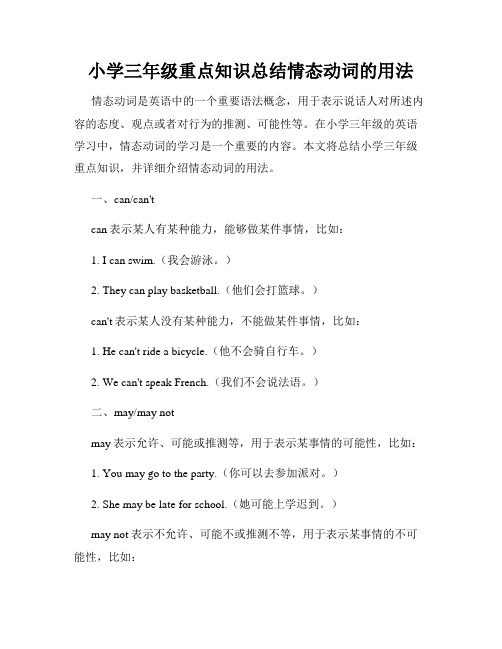
小学三年级重点知识总结情态动词的用法情态动词是英语中的一个重要语法概念,用于表示说话人对所述内容的态度、观点或者对行为的推测、可能性等。
在小学三年级的英语学习中,情态动词的学习是一个重要的内容。
本文将总结小学三年级重点知识,并详细介绍情态动词的用法。
一、can/can'tcan表示某人有某种能力,能够做某件事情,比如:1. I can swim.(我会游泳。
)2. They can play basketball.(他们会打篮球。
)can't表示某人没有某种能力,不能做某件事情,比如:1. He can't ride a bicycle.(他不会骑自行车。
)2. We can't speak French.(我们不会说法语。
)二、may/may notmay表示允许、可能或推测等,用于表示某事情的可能性,比如:1. You may go to the party.(你可以去参加派对。
)2. She may be late for school.(她可能上学迟到。
)may not表示不允许、可能不或推测不等,用于表示某事情的不可能性,比如:1. They may not eat ice cream.(他们可能不吃冰淇淋。
)2. It may not rain tomorrow.(明天可能不会下雨。
)三、must/must notmust表示必须,用于表示肯定或强制性的命令和推测,比如:1. We must finish our homework.(我们必须完成作业。
)2. She must be tired.(她一定累了。
)must not表示禁止或不允许,用于表示否定的命令或禁止,比如:1. You must not eat in the classroom.(你不能在教室里吃东西。
)2. They must not be late for the meeting.(他们不可以迟到会议。
小学六年重要知识点情态动词的能力与可能用法

小学六年重要知识点情态动词的能力与可能用法情态动词是英语语法中的一类特殊动词,它们用来表示说话人的态度、意愿、能力和可能性。
对于小学六年级的学生来说,了解情态动词的基本用法和特点是非常重要的。
在本文中,我们将介绍一些小学六年级重要的情态动词知识点,包括能力与可能用法。
一、能力用法1. Can"Can"是最常用的表示能力的情态动词。
它用来表达某人有能力做某事。
例如:- I can swim.(我会游泳。
)- She can play the guitar.(她会弹吉他。
)在肯定句中,"can"后面直接接动词原形。
在否定句中,将"can"改为"cannot"或缩写形式"can't"。
例如:- I cannot swim. / I can't swim.(我不会游泳。
)2. Could"Could"是"can"的过去式,在表示过去能力的情况下使用。
例如:- When I was younger, I could climb trees.(在我年轻的时候,我会爬树。
)同样地,将"could"改为"could not"或缩写形式"couldn't",可以表示过去的无能或不能。
例如:- I couldn't swim when I was a child.(我小时候不会游泳。
)3. Be able to"Be able to"的意思与"can"相似,表示现在或过去的能力。
它在一般疑问句中用于一般情况下,而不是临时性的情况。
例如:- Are you able to speak French?(你会说法语吗?)- Were you able to solve the math problem?(你能解决数学问题吗?)二、可能用法1. May"May"用来表示某个行为或事件有可能发生。
小学英语情态动词知识点及练习

情态动词【知识要点】:情态动词(Modal verbs)本身有一定的词义, 表示语气的单词。
但是不能独立作谓语, 只能和动词原形一起构成谓语。
情态动词用在行为动词前, 表示说话人对这一动作或状态的看法或主观设想。
情态动词虽然数量不多, 但用途广泛, 主要有下列: can (could), may (might), must, need, ought to, dare (dared), shall (should), will (would) must not.情态动词无人称和数的变化, 情态动词后面跟的动词须用原形, 否定式构成是在情态动词后面加 "not"。
疑问形式是将情态动词提至主语前。
个别情态动词有现在式和过去式两种形式, 过去式用来表达更加客气, 委婉的语气, 时态性不强, 可用于过去, 现在或将来。
情态动词属非及物动词, 故没有被动语态。
【典型例题】:【专题一】:can和could的用法【例1】Can you lift this heavy box?(体力)【解析】表示能力(体力、知识、技能)【练习】1.Mary speak three languages.(知识)2... yo.skate?(技能)此时可用be able to代替。
Can只有一般现在时和一般过去式;而be able to 则有更多的时态。
I’ll not be able to come this afternoon.当表示“经过努力才得以做成功某事”时应用be able to,不能用Can。
【例2】-----Can I go now?----.Yes.yo.can..No.yo.can’t.【解析】表示请求和允许。
此时可与may互换。
在疑问句中还可用could,might 代替,不是过去式,只是语气更委婉,不能用于肯定句和答语中。
【练习】---- I come to see you tomorrow?---.Yes.yo.....----No.yo..../I’.afrai.not.【例3】Can this be true?【解析】表示推测(惊讶、怀疑、不相信的态度),用于疑问句、否定句和感叹句中。
小学五年级重点知识归纳情态动词的用法与句型构造
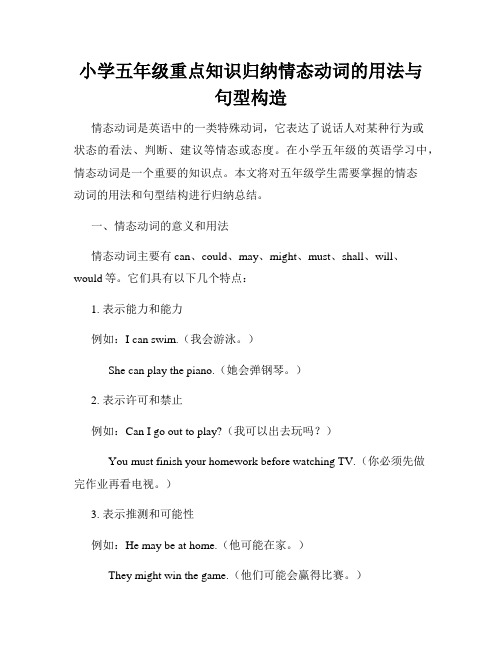
小学五年级重点知识归纳情态动词的用法与句型构造情态动词是英语中的一类特殊动词,它表达了说话人对某种行为或状态的看法、判断、建议等情态或态度。
在小学五年级的英语学习中,情态动词是一个重要的知识点。
本文将对五年级学生需要掌握的情态动词的用法和句型结构进行归纳总结。
一、情态动词的意义和用法情态动词主要有can、could、may、might、must、shall、will、would等。
它们具有以下几个特点:1. 表示能力和能力例如:I can swim.(我会游泳。
)She can play the piano.(她会弹钢琴。
)2. 表示许可和禁止例如:Can I go out to play?(我可以出去玩吗?)You must finish your homework before watching TV.(你必须先做完作业再看电视。
)3. 表示推测和可能性例如:He may be at home.(他可能在家。
)They might win the game.(他们可能会赢得比赛。
)4. 表示意愿和请求例如:I will help you.(我会帮助你。
)Could you pass me the pen, please?(请你给我递一支笔,好吗?)二、情态动词的句型构造1. 肯定句情态动词后面直接跟动词原形。
例如:He can swim.(他会游泳。
)They will come tomorrow.(他们明天会来。
)2. 否定句在情态动词后面加not。
例如:I cannot play basketball.(我不能打篮球。
)She will not go to the party.(她不会参加聚会。
)3. 疑问句将情态动词放在句子的开头。
例如:Can you help me?(你能帮助我吗?)Will she come to the concert?(她会来听音乐会吗?)4. 一般疑问句回答主语+情态动词。
小学情态动词的学习
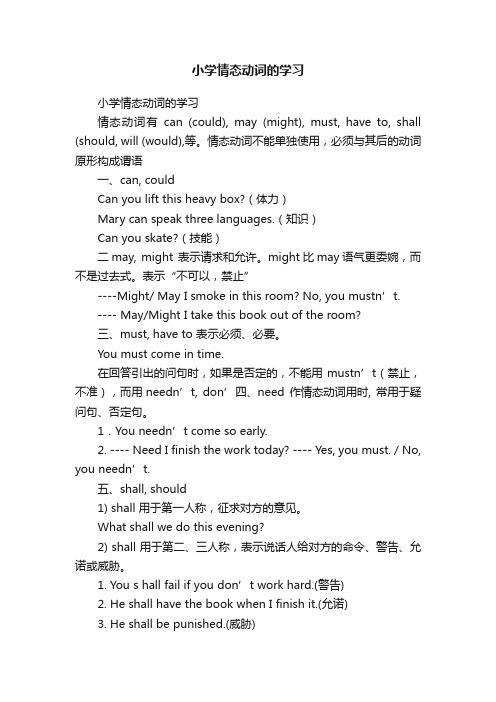
小学情态动词的学习小学情态动词的学习情态动词有can (could), may (might), must, have to, shall (should, will (would),等。
情态动词不能单独使用,必须与其后的动词原形构成谓语一、can, couldCan you lift this heavy box?(体力)Mary can speak three languages.(知识)Can you skate?(技能)二may, might 表示请求和允许。
might比may语气更委婉,而不是过去式。
表示“不可以,禁止”----Might/ May I smoke in this room? No, you mustn’t.---- May/Might I take this book out of the room?三、must, have to 表示必须、必要。
You must come in time.在回答引出的问句时,如果是否定的,不能用mustn’t(禁止,不准),而用needn’t, don’四、need 作情态动词用时, 常用于疑问句、否定句。
1.You needn’t come so early.2. ---- Need I finish the work today? ---- Yes, you must. / No, you needn’t.五、shall, should1) shall 用于第一人称,征求对方的意见。
What shall we do this evening?2) shall 用于第二、三人称,表示说话人给对方的命令、警告、允诺或威胁。
1. You s hall fail if you don’t work hard.(警告)2. He shall have the book when I finish it.(允诺)3. He shall be punished.(威胁)六、will, wouldWill / Would you pass me the ball, please?will never do that again.They asked him if he would go abroad.情态动词两要点;动词原形跟后面,说话语气较委婉,can表"能力"may"许可",must"责任"或"义务",否定回答"needn't"换;should"应该",would"愿",have to "被迫"表客观.注释:对must构成的一般疑问句作否定回答只能用needn't.1. A can you play the piano? (you/play)B No, I can’t, but I can play the violin.2. A ___________________ Chinese? (you/speak)B Yes, I _____, but I ___________ it well.3. A ___________________? (your brother/drive)B Yes, he _____, but he ___________ well.4. A ___________ his new job on Monday? (Hua An/start)B No, he _____, but he ___________ on Tuesday.5. A ___________________ chess? (your mother/play)B No, she _____, but she ___________ poker (?K?J$6. A ___________ me ?100? (you/lend)B No, I _____, but I ___________ you? 50.7. A ___________ the 8:30 bus? (Mr. Ye/catch)B No, he _____, but he ___________ the 9:30 bus.改错1. She can't sings well.2. What dishes you can cook?3. Where do we can go today?May and may notMay I leave the room? Yes, you may.May we do? No, you may not. (No, you mayn't)根据情景和答句,用括号中的词提问。
小学中的常见情态动词知识点的归纳与解析

小学中的常见情态动词知识点的归纳与解析情态动词在英语语法中起着非常重要的作用。
对于小学生来说,了解和正确使用常见的情态动词是构建良好语言基础的关键。
本文将对小学中的常见情态动词知识点进行归纳与解析,帮助学生更好地掌握这些语法要点。
一、常见的情态动词1. can:表示能力、许可或可能性。
例如:I can swim.(我会游泳。
)2. could:表示过去的能力、许可或可能性。
例如:When I was young, I could run very fast.(当我年轻时,我能跑得很快。
)3. may:表示许可或可能性。
例如:May I go to the bathroom?(我可以去洗手间吗?)4. might:表示过去或将来某个时间的可能性。
例如:He might come to the party tomorrow.(明天他可能会来参加晚会。
)5. shall:表示应该或将要发生的事情。
例如:Shall we go to the park tomorrow?(我们明天去公园好吗?)6. should:表示应该做的事情。
例如:You should eat fruits and vegetables every day.(你每天应该吃水果和蔬菜。
)7. will:表示将要发生的事情或意愿。
例如:I will help you withyour homework.(我会帮你做作业。
)8. would:表示过去的意愿、习惯或建议。
例如:When I was a child,I would always play with my friends.(当我还是个孩子时,我总是和朋友们一起玩。
)9. must:表示必须或对某种情况的肯定。
例如:You must finish your homework before watching TV.(你必须先完成作业再看电视。
)10. ought to:表示应该或理应做的事情。
情态动词全部知识点总结
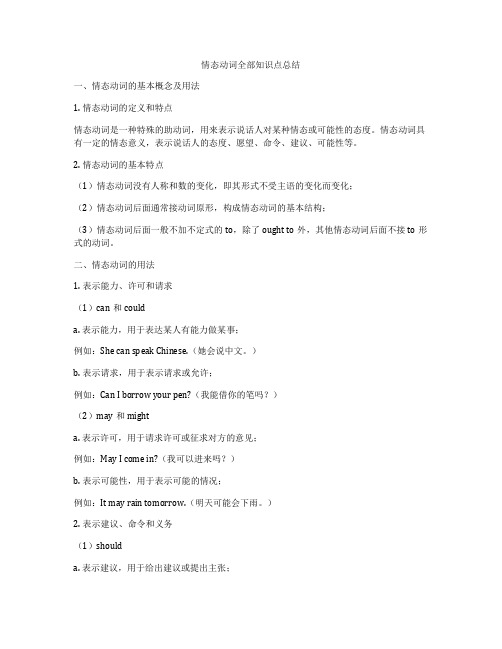
情态动词全部知识点总结一、情态动词的基本概念及用法1. 情态动词的定义和特点情态动词是一种特殊的助动词,用来表示说话人对某种情态或可能性的态度。
情态动词具有一定的情态意义,表示说话人的态度、愿望、命令、建议、可能性等。
2. 情态动词的基本特点(1)情态动词没有人称和数的变化,即其形式不受主语的变化而变化;(2)情态动词后面通常接动词原形,构成情态动词的基本结构;(3)情态动词后面一般不加不定式的to,除了ought to外,其他情态动词后面不接to形式的动词。
二、情态动词的用法1. 表示能力、许可和请求(1)can和coulda. 表示能力,用于表达某人有能力做某事;例如:She can speak Chinese.(她会说中文。
)b. 表示请求,用于表示请求或允许;例如:Can I borrow your pen?(我能借你的笔吗?)(2)may和mighta. 表示许可,用于请求许可或征求对方的意见;例如:May I come in?(我可以进来吗?)b. 表示可能性,用于表示可能的情况;例如:It may rain tomorrow.(明天可能会下雨。
)2. 表示建议、命令和义务(1)shoulda. 表示建议,用于给出建议或提出主张;例如:You should see a doctor.(你应该去看医生。
)b. 表示义务,用于表示责任或义务;例如:We should obey the law.(我们应该遵守法律。
)(2)ought toa. 表示责任或义务,用于表示应该做的事情;例如:You ought to apologize to her.(你应该向她道歉。
)3. 表示可能性和必然性(1)musta. 表示必然性,用于表示肯定的推断或必然的结论;例如:He must be at home now.(他现在一定在家。
)b. 表示义务,用于表示应遵守的规定或责任;例如:Students must wear school uniforms.(学生必须穿校服。
小学英语六年级情态动词用法归纳讲解学习
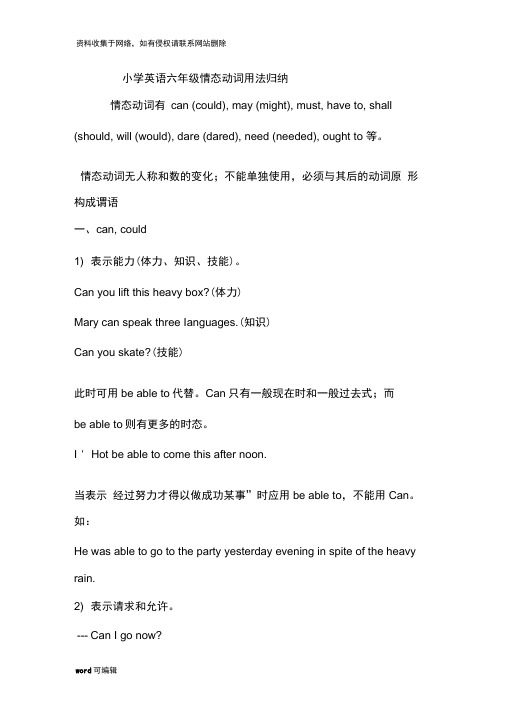
小学英语六年级情态动词用法归纳情态动词有can (could), may (might), must, have to, shall (should, will (would), dare (dared), need (needed), ought to 等。
情态动词无人称和数的变化;不能单独使用,必须与其后的动词原形构成谓语一、can, could1) 表示能力(体力、知识、技能)。
Can you lift this heavy box?(体力)Mary can speak three Ianguages.(知识)Can you skate?(技能)此时可用be able to代替。
Can只有一般现在时和一般过去式;而be able to则有更多的时态。
I ' Hot be able to come this after noon.当表示经过努力才得以做成功某事”时应用be able to,不能用Can。
如:He was able to go to the party yesterday evening in spite of the heavy rain.2) 表示请求和允许。
--- Can I go now?——Yes, you can. / No, you can' t.此时可与may互换。
在疑问句中还可用could,might代替,不是过去式,只是语气更委婉,不能用于肯定句和答语中。
——Could I come to see you tomorrow?----Yes, you can. ( No, I ' mfraid not.)3)表示客观可能性(客观原因形成的能力)。
They' vecha nged the timetable, so we can go by bus in stead.This hall can hold 500 people at least.4)表示推测(惊讶、怀疑、不相信的态度),用于疑问句、否定句和感叹句中。
- 1、下载文档前请自行甄别文档内容的完整性,平台不提供额外的编辑、内容补充、找答案等附加服务。
- 2、"仅部分预览"的文档,不可在线预览部分如存在完整性等问题,可反馈申请退款(可完整预览的文档不适用该条件!)。
- 3、如文档侵犯您的权益,请联系客服反馈,我们会尽快为您处理(人工客服工作时间:9:00-18:30)。
小学情态动词的学习
情态动词有can (could), may (might), must, have to, shall (should, will (would),等。
情态动词不能单独使用,必须与其后的动词原形构成谓语
一、can, could
Can you lift this heavy box?(体力)
Mary can speak three languages.(知识)
Can you skate?(技能)
二may, might 表示请求和允许。
might比may语气更委婉,而不是过去式。
表示“不可以,禁止”----Might/ May I smoke in this room? No, you mustn’t.
---- May/Might I take this book out of the room?
三、must, have to 表示必须、必要。
You must come in time.
在回答引出的问句时,如果是否定的,不能用mustn’t(禁止,不准),而用needn’t, don’
四、need 作情态动词用时, 常用于疑问句、否定句。
1.You needn’t come so early.
2. ---- Need I finish the work today? ---- Yes, you must. / No, you needn’t.
五、shall, should
1) shall 用于第一人称,征求对方的意见。
What shall we do this evening?
2) shall 用于第二、三人称,表示说话人给对方的命令、警告、允诺或威胁。
1. You s hall fail if you don’t work hard.(警告)
2. He shall have the book when I finish it.(允诺)
3. He shall be punished.(威胁)
六、will, would
Will / Would you pass me the ball, please?
will never do that again.
They asked him if he would go abroad.
情态动词两要点;动词原形跟后面,说话语气较委婉,can表"能力"may"许可",must"责任"或"义务",否定回答"needn't"换;should"应该",would"愿",have to "被迫"表客观.
注释:对must构成的一般疑问句作否定回答只能用needn't.
1. A can you play the piano? (you/play)
B No, I can’t, but I can play the violin.
2. A ___________________ Chinese? (you/speak)
B Yes, I _____, but I ___________ it well.
3. A ___________________? (your brother/drive)
B Yes, he _____, but he ___________ well.
4. A ___________ his new job on Monday? (Hua An/start)
B No, he _____, but he ___________ on Tuesday.
5. A ___________________ chess? (your mother/play)
B No, she _____, but she ___________ poker (?K?J$
6. A ___________ me ?100? (you/lend)
B No, I _____, but I ___________ you? 50.
7. A ___________ the 8:30 bus? (Mr. Ye/catch)
B No, he _____, but he ___________ the 9:30 bus.
改错
1. She can't sings well.
2. What dishes you can cook?
3. Where do we can go today?
May and may notMay I leave the room? Yes, you may.
May we do? No, you may not. (No, you mayn't)
根据情景和答句,用括号中的词提问。
1 The television is very loud, and you and your sister are studying, (may)
A May we turn down the television?
B Yes, please turn it down.
2 It’s hot, and the air conditioner is off. (can)
A _____________________________________________________
B Yes, you can turn it on.
3 You and your friend see some lost tourists, (can)
A _____________________________________________________
B Oh yes, please help us!
4 You want some ice cream, but you have no money, (can)
A _________________________________________________
B Of course you can borrow $20.
5 You see three of your friends playing tennis, (may)
A ___________________________________________________
B Yes, please join us! We need a fourth player.
6 You don't understand an English word, (may)
A _______________________________________________
B Yes, please use my dictionary.
7 You want to order dimsum in a restaurant, (can)
A ____________________________________________
B Yes, of course you can have the menu.。
